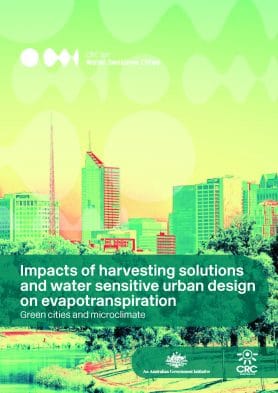The impacts of harvesting solutions and WSUD on evaporation and the water balance and feedbacks to urban hydrology and stream ecology
Abstract
Urban development drastically alters the natural hydrology of the landscape as impervious surfaces replace natural vegetation and soils. This reduces the infiltration of water into soils, and increases surface runoff . This leads to a deficit of water in the urban landscape and reduces evapotranspiration. This is widely documented as a contributor to increased urban warming and the formation of the urban heat island (UHI). Water sensitive urban design (WSUD) and urban greening can help to restore a more natural hydrology in urban areas and increase levels of evapotranspiration and help cool the local scale urban environment.
This report focusses on how urban development modifies the urban water balance and its links to the urban surface energy balance – which is fundamental to the development of urban climates. This report also explores the impacts of urban water management that may lead to an increase in evapotranspiration, and thereby alter the surface energy balance to improve urban climates.
